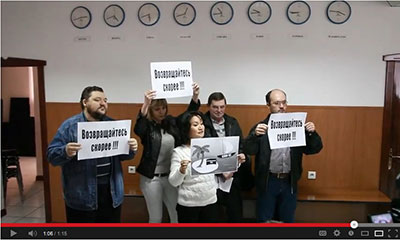A blocked website; reporting equipment confiscated; a newsroom sealed; and reporters denied information from state agencies: these things together spelled the end of Stan.kz, a local, independent Internet-based broadcaster which for two years had tirelessly reported on developments in Kazakhstan. “We are forced to shut down the Stan.kz newsroom,” Bauyrzhan Musirov, owner of parent Stan Production Company, said at a press conference Wednesday in Almaty, Kazakhstan’s main city.
Stan.kz had long criticized national and municipal authorities, but the final straw for the repressive government was apparently an oil workers’ strike and its brutal suppression by police in the western town of Zhanaozen in December, 2011. In defiance of national laws and a public commitment to protect and advance human rights at home and abroad–Kazakhstan was elected to the U.N. Human Rights Council in November, 2012–the government fiercely retaliated against media outlets who exposed its repressive activity. Authorities launched a fierce crackdown against the media just after the Zhanaozen clashes, and renewed the battle around the first anniversary of their reporting on the violence. After a judicial campaign of just a few weeks, all the leading independent media–newspapers Respublika and Vzglyad, and broadcasters K-Plus and Stan.kz, were ordered blocked and shutdown in late December on fabricated charges of extremism.
Elina Zhdanova, founder of Stan Production, told CPJ that prosecution of the broadcaster was unjust and illogical from beginning to end. First, she said, authorities arbitrarily branded the outlets extremist in a verdict handed to Vladimir Kozlov, an opposition activist jailed in connection to the Zhanaozen clashes. None of the outlets had any connection to the activist or his trial, and hence could not object to the statements made against them during his court hearings. This, however, did not stop the prosecutors or the courts from pinning them with the “extremist” label and using Kozlov’s verdict to justify criminal prosecution of the media.
Second and more significantly, while authorities de jure targeted Zhdanova’s regional partner, Kyrgyzstan-based media company Stan TV, de facto it was a team of local journalists at Almaty-based Stan.kz that landed in the cross hairs. “Both in Kozlov’s verdict and in subsequent court rulings against the outlets, authorities mentioned ‘foreign media outlet Stan TV,’ but this is a completely different organization to which our newsroom has absolutely no legal connection,” Zhdanova told CPJ. Her news outlet had its own website and only contributed reporting to Stan TV projects at the latter’s request, but Stan.kz, not its Kyrgyz partner, is blocked inside the country and abroad.
Zhdanova told CPJ that she sought advice on the indictment and rulings from independent Kazakh lawyers, but they were too shocked at the number of legal and procedural violations in the case files to offer any useful direction. Investigators and prosecutors failed to depict any violations of the law by the media, and presented no evidence except listing headlines that allegedly contained extremism, Zhdanova said. “But we were all doing our job–we reported on the facts, and interviewed people, nothing else,” she told CPJ. Unwilling to participate in the farce or accept the designation as a foreign news outlet, the journalists stayed away from the trial. “Maybe it was a mistake, but we felt we made the right choice,” Zhdanova said.
As it turned out, this was not the end of their surreal ordeal. On December 19, agents with the Kazakh security service, or KNB, raided the Stan.kz newsroom, confiscated all the reporting equipment–about 30 notebook computers, 15 cameras, numerous hard and flash drives, and memory cards–and sealed the office, with the journalists’ personal belongings inside. The agents said the raid was connected to a criminal case against a person from whom the journalists leased the office space.
For three months, Zhdanova and her team have been unable to enter the newsroom or retrieve their belongings–or even get a simple explanation from the KNB as to how their confiscated reporting equipment was linked to the property owner or his case. “They pretend that nothing has happened, maintain silence, and ignore our calls and requests,” Zhdanova told CPJ.
For a while, the journalists tried to produce news anyway, crammed into a much smaller room, working on a single computer, and denied access to official information, but they eventually gave up, Zhdanova said. “The case was politicized from the very beginning, and it ended as a showcase whipping for the rest of the Kazakh media,” she told CPJ. “It slashed the Kazakh media market.”
However, Zhdanova and the other journalists are not wholly conceding defeat. A new media project is in the making, to be called “Namystan” (Be Truthful in Kazakh). We wish them good luck.
